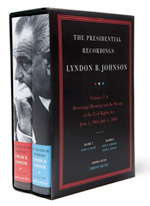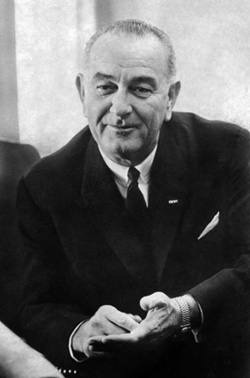The Power Broker's Other Voice
The story behind LBJ's pursuit of the civil rights bill.
President Lyndon Johnson, domineering and manipulative, lives on in American memory as the classic power broker. He bullied opponents, sweet-talked skeptics, and chewed out subordinates. He oozed confidence as he passed one piece of landmark social legislation after another, even as his cockiness helped to mire the country in Vietnam. Yet this is not the Johnson who emerges from volumes seven and eight of The Presidential Recordings, a transcription of his phone conversations from June 1 to July 4 of 1964.
The power broker was in top form at the beginning of this five-week span, guiding the Civil Rights Act through a divided United States Senate. By the end, the master politician was plotting his re-election campaign. But in between, we hear Johnson's voice hitting unfamiliar registers—this collection also includes a DVD with audio footage—as it crackles across the decades.
Five days after the assassination of John F. Kennedy, Johnson committed himself to a strong civil rights bill. Scholars have depicted this as a defining moment in his presidency. The native Texan wanted to show skeptical Northern liberals that he stood tall for racial equality. Just as crucial, Johnson was driven by ambition. He believed that passage of this bill would help secure for him a grand legacy.
According to the legend, Johnson admitted to White House aides that his signing of the Civil Rights Act would hand the South to the Republican Party for generations to come. It was a high price, but one that Johnson was willing to pay. This prediction has become a central part of the Johnson story. Historians, drawing on memoirs of White House insiders, retell this story with reverence in the way that relatives pass down cherished pieces of family lore. The Democrats thus became the party of racial progress; the Republicans seized the South. The story remains so powerful because Johnson gazed far into the future, foreseeing those political maps of America that would color entire regions in red or blue.
To hear Johnson's phone conservations from these five weeks is to reconsider the received wisdom and appreciate how a proliferation of events threw him off balance. Here we have the immediate record; the muck of history has yet to be tidied. Over the course of these five weeks, Johnson's historical legacy became the least of his concerns. And he remained intent on winning the votes of white Southerners. In retrospect, it all looks like a succession of decisive turning points. At the time, however, Johnson realized he was scrambling to adapt to volatile circumstances.
Johnson was neither the first president to tape his White House conversations nor the most thorough. Franklin Roosevelt, Harry Truman, and Dwight Eisenhower all recorded selected discussions. John F. Kennedy installed an elaborate taping system and made liberal use of it. Of course, Richard Nixon went the furthest, taping thousands of conversations. Lyndon Johnson relied on Dictaphone equipment to record many of his own phone conversations. The occasional office meeting was also recorded when the speakerphone—Johnson's "squawk box"—remained active. We are now flies on history's wall.
On June 10, 1964, the United States Senate voted to end debate over the Civil Rights Act. This halted the longest filibuster in Senate history and ensured the law's eventual passage. Johnson rammed this bill down the throats of his fellow Southern Democrats. It was his greatest victory to date. But tragedy overshadowed triumph. Before Johnson signed the bill into law, three civil rights workers disappeared in Neshoba County, Miss. Suddenly, Johnson found himself trying to navigate a treacherous terrain—one that included a murderous Ku Klux Klan, callous Mississippi politicians, a galvanized civil rights movement, and grief-stricken parents.
The world of Washington politics was Johnson's comfort zone; the racial violence in Mississippi thrust him into an entirely different realm. He had to marshal emotion and adjust to explosive events rather than to amass power and count votes. "This Mississippi thing is awful mean," he admitted to Richard Daley (Chicago's mayor) on June 29. "I don't know what in the world is going to happen."

Johnson learned on June 22 that James Chaney, Andrew Goodman, and Mickey Schwerner were missing in the Magnolia State. He gathered the facts from FBI head J. Edgar Hoover, and began to phone Mississippi's elected officials. He attempted to balance many cross-pressures. Johnson looked ahead to the passage of the Civil Rights Act, hoping that white Southerners would comply with the new law. He feared a replay of Little Rock or Ole Miss. "I'm not going to send troops on my people if I can avoid it," Johnson told Secretary of Commerce Luther Hodges. To promote peaceful compliance, he tried to find his way into the good graces of white Southern leaders—the very leaders whom he had just defeated on the Senate floor.
Johnson also had the November election on his mind. A showdown with Republican Barry Goldwater loomed. And Goldwater, with his resistance to the Civil Rights Act, had targeted the votes of white Southerners. Johnson still thought he might keep the old Democratic coalition from unraveling. This grew more difficult by the day.
The depths of white Southerners' hostility can startle the 21st- century ear. Johnson himself was caught off guard by the extent of their intransigence. He made a show of appearing sympathetic, while never taking their views seriously. On the afternoon of July 23, Johnson asked Mississippi Sen. James Eastland what could be done about the civil rights workers. "I don't believe there's three missing," Eastland boldly responded. "I believe it's a publicity stunt." Eastland explained why the reports out of Philadelphia, Mississippi were false. "There's not a Ku Klux Klan in that area," he asserted in a high-pitched Delta accent. "There's no organized white man in that area." He wondered, "who would—could possibly harm them?" Johnson often replied "mm-hmm" to such claims, careful not to betray his own views. (You can listen to the audio clip at the end of the piece.) He quickly realized that he would receive no cooperation from this quarter. Eastland would not even grant the premise of his phone call.
Mississippi's other senator, John Stennis, later stood on the Senate floor and blamed the violence on the civil rights workers themselves. Johnson never called these insults what they were. He got on the phone with Stennis and humored him. "I just wanted you to know, my friend, and I love you, and I know your heart's bleeding, and mine is … too, and maybe somehow we'll work out of it." Johnson always believed that he could "work out of it" no matter the situation—that he could compromise, negotiate, or coerce. In this case, Johnson could do no such thing. Hoover advised Johnson that the young men were probably murdered. Their car had been discovered on the side of a rural highway, burned beyond recognition.
The families of Schwerner and Goodman asked for audiences with the president. This was hardly the kind of constituent service that suited Johnson, who complained that he "oughtn't to be a babysitter." But after prodding from Attorney General Robert F. Kennedy, Johnson finally granted the request. These conversations form the collection's emotional high points, as president and parents were buffeted by uncertain news. On the evening of June 23, Hoover notified Johnson that the burned car contained no dead bodies. The men might have survived after all. Johnson called the parents to relay this hopeful news. Anne Schwerner wept as she thanked Johnson for his call. Robert Goodman fought through sobs and said, "Mr. President, I can't express my words to thank you for what you're doing: for these boys and us." (You can listen to the audio clip at the end of the piece.)
Unfortunately, Johnson had not done very much. The FBI maintained a weak presence in Mississippi—this despite the recent murders of black leaders like Medgar Evers. And after the disappearances in Neshoba County, Johnson pursued a cautious course of action: He sent Allen Dulles to Mississippi as an "impartial" observer.
Johnson trusted J. Edgar Hoover too much. On June 29, Johnson met with Mickey Schwerner's wife. Hoover then got on the phone and told Johnson: "She's a Communist, you know. … She's an actual member." Johnson quickly repeated this information to Lee White, his chief civil rights aide, describing Schwerner as "some little scrubby woman that's a Communist." White laughed "heartily."
The tapes make it clear that the president who enacted the most important civil rights legislation of the last 140 years was deeply suspicious of the civil rights movement. Johnson phoned only two African-Americans during this five-week span: NAACP head Roy Wilkins and National Urban League director Whitney Young. Both were moderates. Johnson thought grass-roots leaders were pushing too fast and too hard. At one point, he referred to Martin Luther King Jr. and James Farmer as "outlaws." In public, Johnson distanced himself from King. Scholars treat this as a pragmatic maneuver designed to hold the political center. But in these phone conversations, Johnson occasionally belittled and denounced King. His maneuvers appear rooted in personal distaste as much as political pragmatism.
In Johnson's last phone call of July 4, he concerned himself again with Martin Luther King. From his ranch in Texas, he scolded his press secretary, George Reedy, for allowing the media to believe that he was in close contact with King. "I haven't been in touch with him at all and don't want to be. You know his record." Johnson was slow to recognize Martin Luther King as a prophet of freedom rather than a dangerous menace. Reedy noted that King had attended the Civil Rights Act signing ceremony two days earlier. "It was very unfortunate he was there," Johnson snapped. "They're making an issue on you, and you'll hear from King before the campaign's over with." (You can listen to the audio clip at the end of the piece.) In Johnson's eyes, his chances for re-election would plummet if the American public linked his civil rights bill with King's activism.
Nursing a sunburn after a long day at the lake, Johnson had settled back into his political comfort zone: The upcoming campaign was foremost in his mind. For a night, he indulged his favorite pastime of counting votes.
President Johnson's phone call with Sen. James Eastland.
President Johnson's phone call with Anne Schwerner.
President Johnson's phone call with George Reedy.
